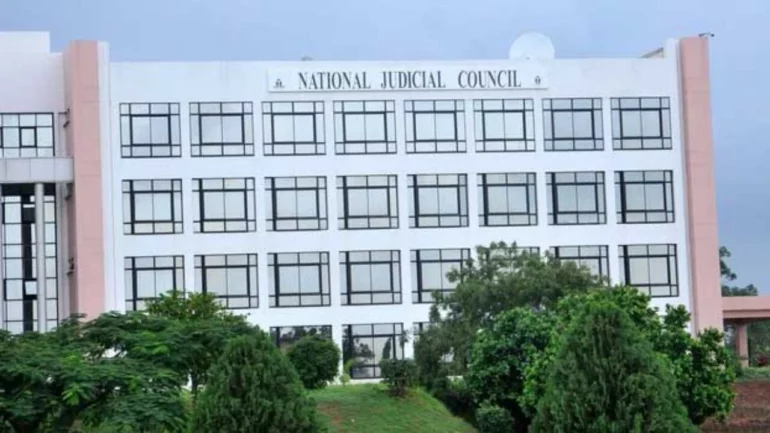The National Judicial Council (NJC) has declared the appointment of Justice Theophilus Nzeukwu as Acting Chief Judge of Imo State null and void. The Council directed Governor Hope Uzodinma to immediately reverse the appointment and instead designate the most senior judicial officer in the state, as mandated by the 1999 Constitution.
This decision was part of the resolutions reached during the NJC’s 108th meeting, held on April 29 and 30, 2025, under the chairmanship of the Chief Justice of Nigeria, Justice Kudirat Kekere-Ekun.
In a statement issued by the NJC’s Deputy Director of Information, Kemi Ogedengbe Babalola, the Council cited Section 271(4) of the Constitution, which stipulates that when the office of a state Chief Judge is vacant or incapacitated, the Governor must appoint the most senior judge of the High Court to act in that capacity. The Council emphasized that this provision had been violated in the case of Justice Nzeukwu’s appointment.
Justice Nzeukwu has been given seven days to explain why disciplinary action should not be taken against him for presenting himself to be sworn in as Acting Chief Judge in contravention of constitutional guidelines. Likewise, Justice V. U. Okorie, President of the Imo State Customary Court of Appeal, who chaired the Judicial Service Commission meeting that recommended the appointment, has also been asked to show cause within seven days for his role in the unconstitutional process.
In broader disciplinary action, the NJC suspended three judges, including a sitting Justice of the Court of Appeal, for gross misconduct. Justice Jane Inyang of the Court of Appeal, Uyo Division, was sanctioned for abuse of office during her tenure at the Federal High Court, Uyo. She was found to have issued improper ex parte orders that led to the sale of a litigant’s petrol station and other businesses during an interlocutory stage, in breach of Rule 3(5) of the Revised Code of Conduct for Judicial Officers. She has been suspended for one year without pay.
Justice Inyang Ekwo of the Federal High Court, Abuja Division, was also suspended for one year without pay and placed on a five-year watch list, during which he will not be eligible for elevation. The Council found that he delivered a ruling on a pending application without hearing from the parties involved, then proceeded to dismiss the charges against the defendants—conduct that violated Rules 3.1 and 3.3 of the Judicial Code.
Similarly, Justice Aminu Baffa Aliyu of the Federal High Court, Zamfara Division, was suspended for one year without pay and placed on a three-year watch list. He was found guilty of granting orders that restrained security agencies from performing their statutory duties and for disregarding established judicial precedent, specifically in Suit No. FHC/GS/CS/30/2021 (Government of Zamfara State vs. EFCC).
Justice A. O. Awogboro of the Federal High Court, Lagos Division, received a formal caution from the Council in connection with a petition involving Suit No. FHC/CS/2021 between Chief Adesanya Musediku and the Assistant Inspector General of Police, Zone 2.
As part of its broader oversight efforts, the NJC empaneled nine committees to investigate 27 judicial officers over various allegations. Of the 43 petitions reviewed, 29 were dismissed for lacking merit, while others were deferred pending appellate decisions. The Council stated that it would continue to ensure accountability and integrity within the judiciary.
In its report, the NJC also rejected a petition challenging the 2022 judicial appointment process in Zamfara State. The petitioner, Mahmud Aliyu, was identified as an unsuccessful applicant whose claims were deemed unsubstantiated and deliberately misleading. He has been barred from future participation in judicial appointment exercises.
Another petition, which challenged the recruitment of six Federal High Court judges in 2021, was dismissed due to a procedural violation. The petitioner failed to file the complaint within six months of the alleged misconduct, as required under Section 11(1) of the Judicial Discipline Regulations.
Significantly, the NJC announced a new measure aimed at improving transparency in the appointment of judicial officers. Henceforth, the names of nominees for appointment to superior courts of record will be made public to allow for comments and objections. This move, the Council said, is intended to promote greater scrutiny, transparency, and public trust in the judicial selection process.
The Council also approved the voluntary retirement of Justice Babatunde Bakre and accepted a name change request from Justice I. A. Osayande of the Edo State High Court, who will now be officially recognized as Justice I. A. Dika.


